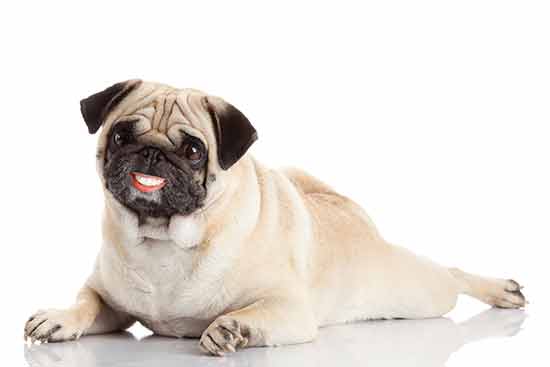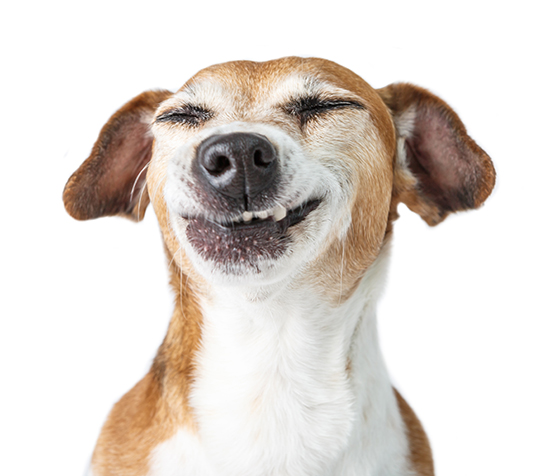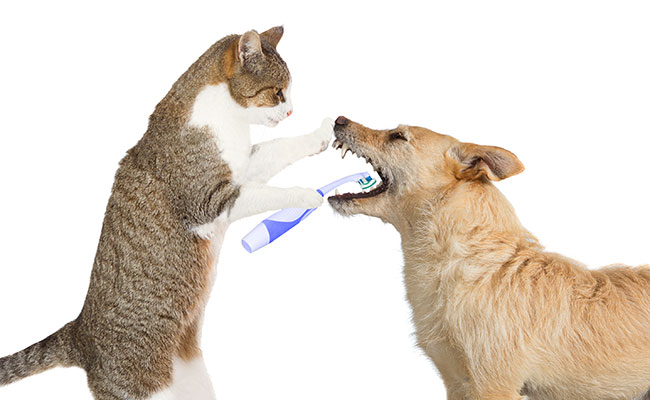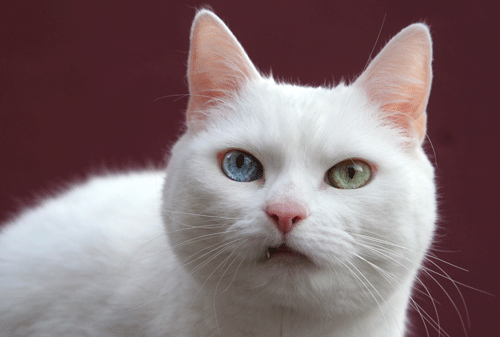Bad Dog Breath
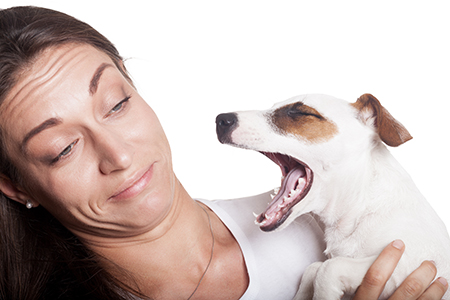 When you think about causes of bad breath among humans you may envision garlic bread, black coffee, onions, smoking, tuna fish sandwiches, illness and poor oral hygiene. But why do dogs get dog breath? When your dog wants to show you love with a few big, slurpy kisses on the nose, and the stinky dog breath makes your toes curl, something is going on. Whitworth Animal Clinic shares some factors that contribute to offensive breath, so you can be aware and take steps help keep your dog’s breath fresh.
When you think about causes of bad breath among humans you may envision garlic bread, black coffee, onions, smoking, tuna fish sandwiches, illness and poor oral hygiene. But why do dogs get dog breath? When your dog wants to show you love with a few big, slurpy kisses on the nose, and the stinky dog breath makes your toes curl, something is going on. Whitworth Animal Clinic shares some factors that contribute to offensive breath, so you can be aware and take steps help keep your dog’s breath fresh.
When Plaque Attacks
Plaque develops from bacteria that grow on teeth when food particles are not removed from between the teeth. The buildup of tartar and dental calculus, followed by gingivitis and tooth infections, yields odor-producing bacteria that can trigger some putrid fumes. A combination of foul breath and dark colored teeth, particularly at the gum line, suggest that plaque is most possibly the cause. Daily brushing with a vet approved doggie toothpaste and toothbrush, a fingertip brush, or even gauze wrapped around a finger can help keep decay away.
Wet Food Can Contribute to Decay
You might think you are feeding your dog only the best when you serve wet food, but unless your dog has a particular condition that Dr. Whitworth has prescribed wet food for, dry crunchy food is preferable. Why? Soft foods are more likely to stick between teeth and provide a breeding ground for a buildup of bacteria. If your dog doesn’t have a medical condition that necessitates wet food, substitute a dry, crunchy food. It actually helps keep teeth clean!
Who Knows Where That Nose has Been …
When a dog investigates something, he doesn’t have the luxury of picking it up and looking at it. The sense of smell and taste are your dog’s analytical tools, which means that fact-finding occurs face first. And dogs don’t really know what is yucky by mere sight. In fact, they often enjoy the smell and taste of things we consider unpleasant, such as dead desiccated frogs, discarded tissues or those special treats in the litter box. Just look at how they greet other dogs….enough said. A result of sticking their tongue and nose in less-than-savory spots can be obnoxious breath. Fortunately this is not a permanent condition, but it may make you consider closing the bathroom door or looking closely at what your dog seems to be enjoying rolling in.
Tooth Decay
The next step beyond plaque and tartar buildup is tooth decay. Or a tooth can crack from chewing on something extremely unyielding, a fall, or an injury. Although most of us don’t pry our dog’s jaws open and perform a dental exam, the cause of the offensive odor could be a broken or rotted tooth. If you can actually see it, it probably is too late to be saved, but having Dr. Whitworth remove the tooth can help prevent associated health issues from the infection.
When Foreign Bodies Make Themselves at Home
Something as innocent looking as a stick your dog was playing with may leave a splinter caught in the roof of your dog’s mouth or between the teeth. Inflammation, infection or abscesses, and then subsequent odor from the bacteria can be the outcome. A thorough oral exam is very important as antibiotics may be required, as well as draining and cleansing the irritation and infection.
Dog Breath May be Indicative of Other Health Problems
In some cases, that odiferous breath can be an indicator of health issues other than dental hygiene. Stinky breath can be a sign of gastrointestinal or esophageal problems or other ailments. Oral tumors and mouth cancers also are a source of halitosis, and the possibility should be investigated when you can’t see the source firsthand. Even food that doesn’t agree with your dog’s digestion, or something unsavory that was ingested can increase gas production, (which can be released from either end).
If the obvious methods of improving your dog’s breath, including brushing, lots of clean fresh water, dental chew bones and crunchy food don’t have much effect, it’s time for a dental exam at Whitworth Animal Clinic, providing veterinary services to pets from Madison, Huntsville, and the surrounding Madison County areas. That dog breath can be your dog’s body telling you something is amiss, unless the overturned garbage can provides a different sort of hint.
Dental Cleaning
Dr. Whitworth recommends a dental cleaning at least once a year. Just like humans, pets need regular dental care and cleanings. Good dental care plays a crucial role in the quality of your pet’s life. Dental disease is the most common medical problem seen in pets and can lead to pain, tooth loss, and generalized disease. We offer routine dental care including exams, x-rays, teeth cleaning, and more.


